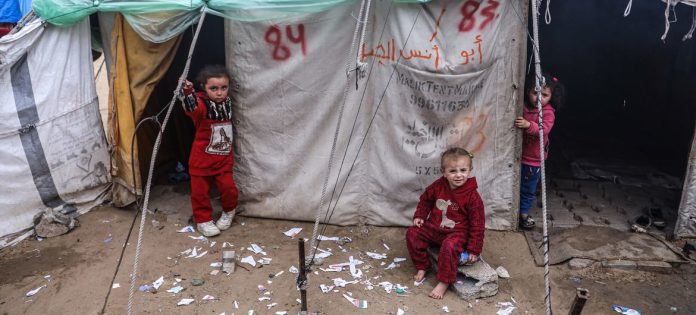A Hamas delegation arrived in Cairo on Saturday to resume talks on a Gaza ceasefire agreement after months of negotiations failed to produce a breakthrough, but there is now significant progress, according to local media.
Egypt-linked Al-Qahera TV quoted a senior source as saying that “significant progress is being made in the talks” between the Palestinian militant group and Israel as Egyptian mediators “have reached an agreed formula on most of the contentious issues.”
A high-ranking Hamas official said the delegation, led by Khalil Al Hayya, deputy head of the group’s political wing in Gaza, would arrive in Cairo on Saturday morning and were in a positive mood after studying Israel’s latest truce proposal. The group said in a statement that the delegation is “determined to secure an agreement in a way that fulfils Palestinians’ demands.”
The Hamas statement came after CIA Director William Burns arrived in Cairo on Friday. Hamas and CIA officials will meet with Egyptian mediators, although it is unclear whether they will meet separately or together.
Egypt, along with Qatar and the US, is leading mediation efforts between Israel and Hamas to bring about a truce in the war, which began on 7 October. Talks have repeatedly begun, but Hamas’ demand for a prolonged ceasefire and a full Israeli withdrawal from Gaza, as well as repeated threats by Israeli Prime Minister Benjamin Netanyahu to push ahead with his plans to attack Rafah, have largely stalled the talks.
Sources say Egypt has asked the US and Israel for more time to persuade Hamas to show more flexibility on the latest proposals to suspend the war. Thus, the latest proposals call for an initial limited truce with a phased hostage exchange, as in previous deals. However, Israel is also reported to have agreed to a “second phase” of the truce, which includes ceasefires lasting up to a year.
The Palestinian group is still believed to be holding about 100 Israelis in Gaza, as well as the bodies of about 30 others who died in captivity. But under the agreement, Hamas will release a number of hostages, including women and the elderly, in exchange for the release of hundreds of Palestinians held in Israeli jails.
RAFAH ASSAULT
The Israeli military assault on the southern Gaza city of Rafah could have dire consequences for the 1.2 million people sheltering in the city, according to WHO director-general Tedros Adhanom Ghebreyesus. He said on X:
“WHO is deeply concerned that a full-scale military operation in Rafah, Gaza, could lead to a bloodbath, and further weaken an already broken health system.”
In a statement, the WHO announced the emergency measures, but warned that the shattered health system would not be able to cope with the surge in casualties and deaths that the incursion into Rafah would cause, as most health facilities in the besieged territory had been damaged or destroyed by intense Israeli bombardment. Only 12 of Gaza’s 36 hospitals and 22 of 88 primary health care facilities are “partially” functioning, the UN health agency said.
“As part of contingency efforts, WHO and partners are urgently working to restore and resuscitate health services,” the statement said, adding that the three currently operating hospitals in Rafiah would become inaccessible if fighting intensifies.
WHO is working to rebuild the largest hospital in southern Gaza, the Nasser Medical Complex in neighbouring Khan Younis, and to establish additional health centres. The military operation in Rafah could also trigger a new wave of displacement, leading to further overcrowding, limited access to food, water and sanitation, and new outbreaks of disease.
Jens Laerke, spokesman for the UN humanitarian agency OCHA, said: “For agencies already struggling to provide humanitarian aid in Gaza, a ground invasion would strike a disastrous blow,” adding that a military operation in Rafah “could lead to a slaughter.”
Earlier, Israeli Prime Minister Benjamin Netanyahu pledged a military operation in the southern Gaza town of Rafah, despite warnings from US President Joe Biden and other Western officials that it would lead to more civilian casualties and worsen an already dire humanitarian crisis.
Netanyahu said Israeli troops would enter Rafah, which is Hamas’ last stronghold, regardless of whether or not there is a truce agreement in exchange for hostages: “We will enter Rafah and we will eliminate the Hamas battalions there – whether or not there is a deal – in order to achieve total victory.”
IDF Chief of Staff Lt. Gen. Herzi Halevi approved final plans for military action in Rafah on Monday, which means the military operation in the city is approaching, but the incursion will be halted or delayed if progress is made in hostage negotiations. On 21 April, Israeli forces launched air strikes on Rafah, killing 22 people, including 18 children, bringing the death toll in Gaza to more than 34,000.
